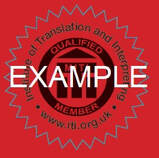 With the sheer number of books and publications that come out of the United States, you’d be forgiven for thinking that the difference between writing American and British English simply boils down to minding your z’s and s’s. While the Brits have generally accepted the use of “organization”, “realize”, etc., the same can’t be said for people on the other side of the pond, who may think you don't know how to spell if your document contains words like ‘organisation’ or ‘behaviour’. However, the difference goes much deeper and, when translating a document into English, it is essential that a) the translator be told which variant of the language should be used and b) that they know the differences. For instance, bonnet is to hood, as petrol is to gas. And you wouldn’t tell an American that you have a flat, unless you’re expecting them to help you change your tyre (or rather, tire). Similarly, in America you wouldn’t draw up Articles of Association for your business. Instead you’d need Bylaws and, when filing your financial statements with the IRS, your Profit and Loss Account becomes an Income Statement. But it’s not only spelling and vocabulary that distinguishes these two variants. Grammar and punctuation also differ. For example, while Mr Smith’s company in the UK aims at achieving success, Mr. Doe’s American company aims to achieve that same success. And don't forget about date formats! In Europe, and at least until the UK leaves the EU, British English is the official variant and, by default, is used in translations, although many businesses prefer to use the US variant to conform to popular usage. Either way, consistency is key and whichever variant you choose should be used throughout the document – that means spelling, grammar, punctuation and vocabulary. Ultimately, know your target audience and adapt accordingly.
0 Comments
 ITI certification seal ITI certification seal Given that in Portugal, unlike in some other countries, there is no such thing as a sworn, official or certified translator (that is, an official court translator), any translation that needs to be certified can only be done so by a notary public, lawyer, solicitor or the Chamber of Commerce. Such a certification, however, does not mean that the authorised entities read and confirm that the translation is correct. Translations that are certified by a notary public simply imply a certificate affixed to the translation, which is appended to the original document in the source language, signed by the translator who, before the notary, declares under oath that the translation in question "is a true and faithful rendering of the original document". If, for instance, you need a translation into English certified for the UK, things change. Although in the United Kingdom the concept of a sworn or certified translator also does not exist, the Home Office, as well as many universities and official bodies in the UK, prefers that translations be certified by a Qualified Member of the Institute of Translation and Interpreting (ITI) or a member of the Chartered Institute of Linguists (CIOL). This type of certified translation is done by the qualified translator themselves, who, if they are a Qualified Member of the ITI for instance, affixes the ITI Certification Seal to the translation, together with a statement with a similar wording to the certificate issued by the notary public. Qualified Members of the ITI and members of the CIOL can also certify translations for other countries, but it is always best to confirm what type of certification is required by the body to which you are submitting the documents. Some bodies or countries only accept translations that have been certified by their respective embassy or consulate, or may even require that they be legalised or apostilled. The same is true for Portuguese certified translations. So, although basically anyone can be a translator in Portugal or the UK because translation isn't a regulated profession, make sure that you contact a professional translator to take care of the translations you need to ensure that they are done properly. - According to Article 49(8) of the Portuguese Civil Registration Code, documents for registration purposes, such as birth certificates, in English, French or Spanish to be submitted to civil registry offices in Portugal no longer require translation. There is a caveat, however: the civil servant receiving the documents must be able to read and understand the aforementioned languages.
- According to Article 68(1)(e) of the Portuguese Notaries Act, a translator is forbidden from translating for spouses or immediate family, including second-degree relatives, and may also not certify translations for them. |
AuthorI'm a Qualified MITI and ISO certified translator. ArchivesCategories |


